HRM363: Challenges and Expectations in Work-Based Learning
VerifiedAdded on 2022/09/07
|5
|1019
|19
Journal and Reflective Writing
AI Summary
This reflective journal entry from a student at RMIT University, enrolled in HRM363, explores their initial expectations and current thoughts regarding work-based learning. The student discusses the skills and capabilities deemed necessary for success in the subject, drawing on existing experiences and highlighting potential challenges, such as the rigidity of some processes and the risk of limited employment opportunities. The student proposes proactive management strategies, including recording and analyzing learning aspects, improving communication, and establishing emotional feedback forums to enhance the learning experience. The journal references several academic sources to support the student's reflections on the subject, the learning process and the challenges and opportunities it presents.
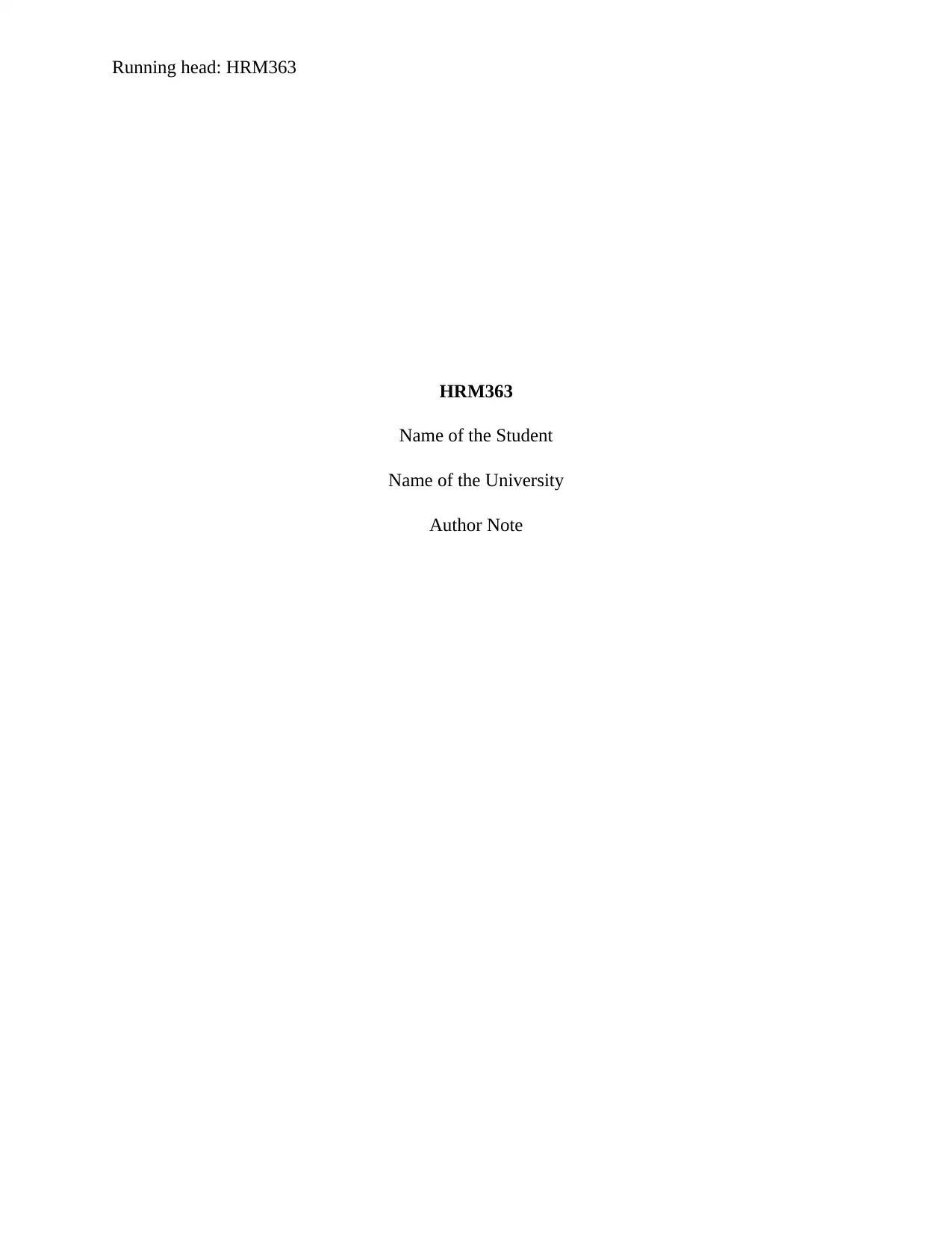
Running head: HRM363
HRM363
Name of the Student
Name of the University
Author Note
HRM363
Name of the Student
Name of the University
Author Note
Paraphrase This Document
Need a fresh take? Get an instant paraphrase of this document with our AI Paraphraser
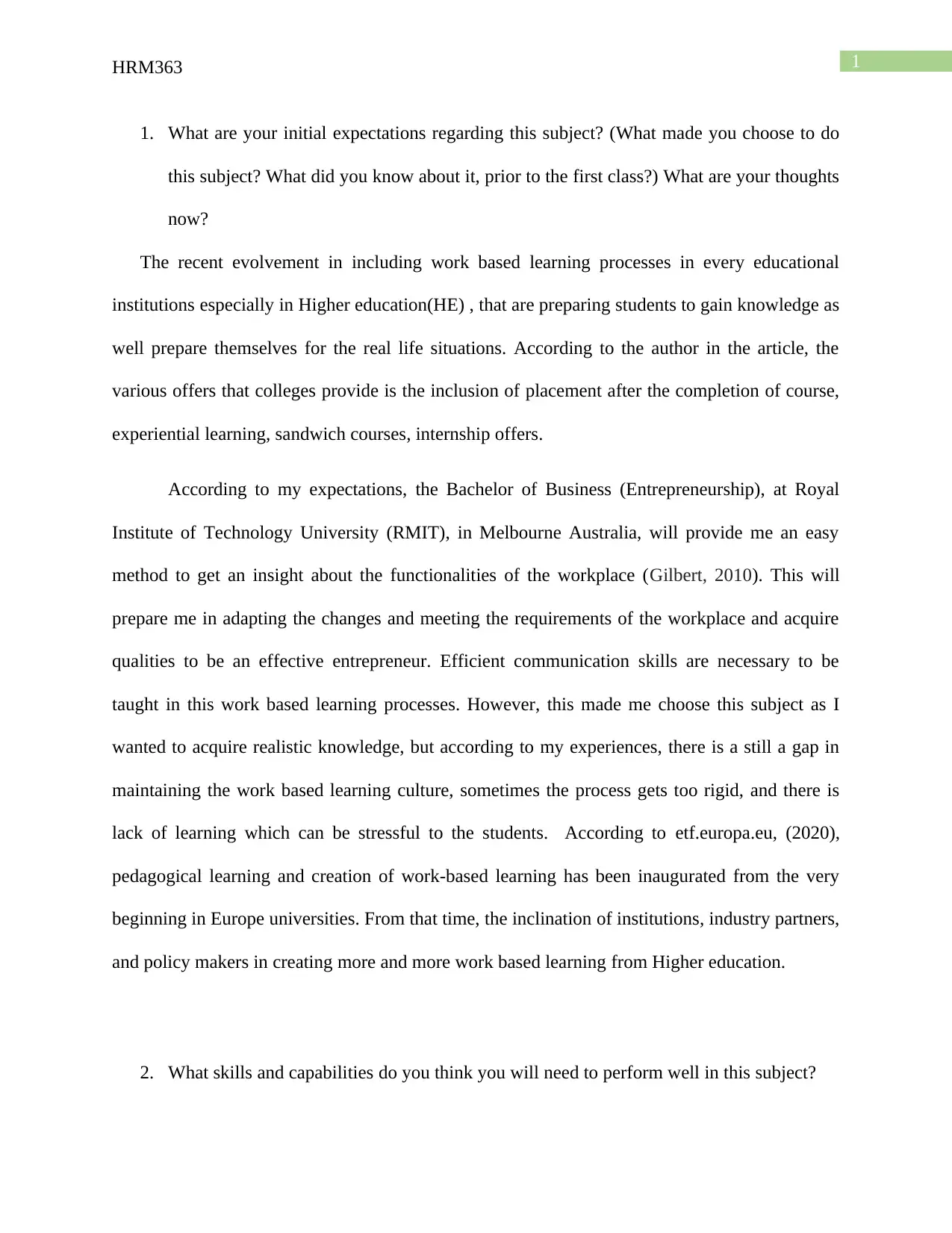
1HRM363
1. What are your initial expectations regarding this subject? (What made you choose to do
this subject? What did you know about it, prior to the first class?) What are your thoughts
now?
The recent evolvement in including work based learning processes in every educational
institutions especially in Higher education(HE) , that are preparing students to gain knowledge as
well prepare themselves for the real life situations. According to the author in the article, the
various offers that colleges provide is the inclusion of placement after the completion of course,
experiential learning, sandwich courses, internship offers.
According to my expectations, the Bachelor of Business (Entrepreneurship), at Royal
Institute of Technology University (RMIT), in Melbourne Australia, will provide me an easy
method to get an insight about the functionalities of the workplace (Gilbert, 2010). This will
prepare me in adapting the changes and meeting the requirements of the workplace and acquire
qualities to be an effective entrepreneur. Efficient communication skills are necessary to be
taught in this work based learning processes. However, this made me choose this subject as I
wanted to acquire realistic knowledge, but according to my experiences, there is a still a gap in
maintaining the work based learning culture, sometimes the process gets too rigid, and there is
lack of learning which can be stressful to the students. According to etf.europa.eu, (2020),
pedagogical learning and creation of work-based learning has been inaugurated from the very
beginning in Europe universities. From that time, the inclination of institutions, industry partners,
and policy makers in creating more and more work based learning from Higher education.
2. What skills and capabilities do you think you will need to perform well in this subject?
1. What are your initial expectations regarding this subject? (What made you choose to do
this subject? What did you know about it, prior to the first class?) What are your thoughts
now?
The recent evolvement in including work based learning processes in every educational
institutions especially in Higher education(HE) , that are preparing students to gain knowledge as
well prepare themselves for the real life situations. According to the author in the article, the
various offers that colleges provide is the inclusion of placement after the completion of course,
experiential learning, sandwich courses, internship offers.
According to my expectations, the Bachelor of Business (Entrepreneurship), at Royal
Institute of Technology University (RMIT), in Melbourne Australia, will provide me an easy
method to get an insight about the functionalities of the workplace (Gilbert, 2010). This will
prepare me in adapting the changes and meeting the requirements of the workplace and acquire
qualities to be an effective entrepreneur. Efficient communication skills are necessary to be
taught in this work based learning processes. However, this made me choose this subject as I
wanted to acquire realistic knowledge, but according to my experiences, there is a still a gap in
maintaining the work based learning culture, sometimes the process gets too rigid, and there is
lack of learning which can be stressful to the students. According to etf.europa.eu, (2020),
pedagogical learning and creation of work-based learning has been inaugurated from the very
beginning in Europe universities. From that time, the inclination of institutions, industry partners,
and policy makers in creating more and more work based learning from Higher education.
2. What skills and capabilities do you think you will need to perform well in this subject?
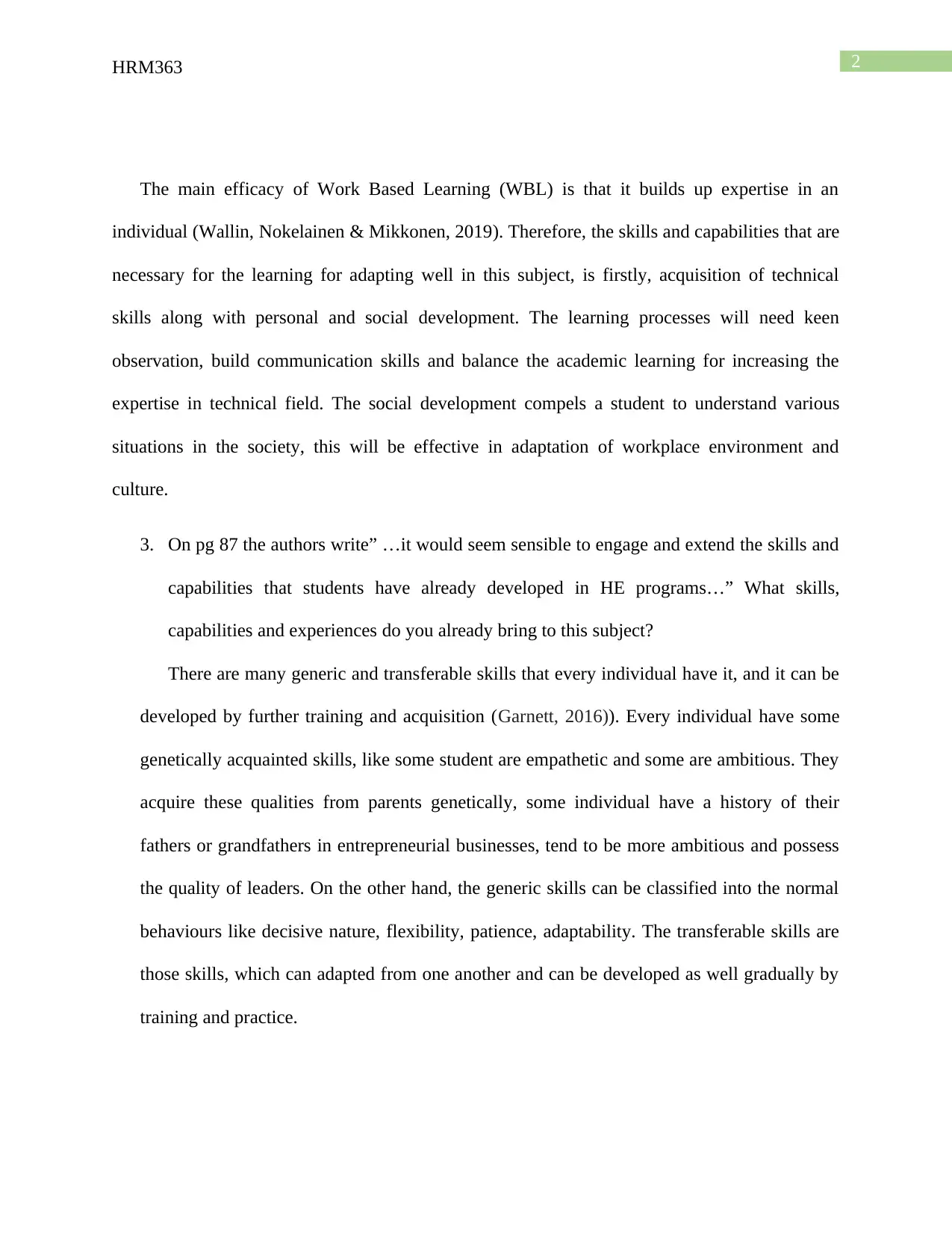
2HRM363
The main efficacy of Work Based Learning (WBL) is that it builds up expertise in an
individual (Wallin, Nokelainen & Mikkonen, 2019). Therefore, the skills and capabilities that are
necessary for the learning for adapting well in this subject, is firstly, acquisition of technical
skills along with personal and social development. The learning processes will need keen
observation, build communication skills and balance the academic learning for increasing the
expertise in technical field. The social development compels a student to understand various
situations in the society, this will be effective in adaptation of workplace environment and
culture.
3. On pg 87 the authors write” …it would seem sensible to engage and extend the skills and
capabilities that students have already developed in HE programs…” What skills,
capabilities and experiences do you already bring to this subject?
There are many generic and transferable skills that every individual have it, and it can be
developed by further training and acquisition (Garnett, 2016)). Every individual have some
genetically acquainted skills, like some student are empathetic and some are ambitious. They
acquire these qualities from parents genetically, some individual have a history of their
fathers or grandfathers in entrepreneurial businesses, tend to be more ambitious and possess
the quality of leaders. On the other hand, the generic skills can be classified into the normal
behaviours like decisive nature, flexibility, patience, adaptability. The transferable skills are
those skills, which can adapted from one another and can be developed as well gradually by
training and practice.
The main efficacy of Work Based Learning (WBL) is that it builds up expertise in an
individual (Wallin, Nokelainen & Mikkonen, 2019). Therefore, the skills and capabilities that are
necessary for the learning for adapting well in this subject, is firstly, acquisition of technical
skills along with personal and social development. The learning processes will need keen
observation, build communication skills and balance the academic learning for increasing the
expertise in technical field. The social development compels a student to understand various
situations in the society, this will be effective in adaptation of workplace environment and
culture.
3. On pg 87 the authors write” …it would seem sensible to engage and extend the skills and
capabilities that students have already developed in HE programs…” What skills,
capabilities and experiences do you already bring to this subject?
There are many generic and transferable skills that every individual have it, and it can be
developed by further training and acquisition (Garnett, 2016)). Every individual have some
genetically acquainted skills, like some student are empathetic and some are ambitious. They
acquire these qualities from parents genetically, some individual have a history of their
fathers or grandfathers in entrepreneurial businesses, tend to be more ambitious and possess
the quality of leaders. On the other hand, the generic skills can be classified into the normal
behaviours like decisive nature, flexibility, patience, adaptability. The transferable skills are
those skills, which can adapted from one another and can be developed as well gradually by
training and practice.
⊘ This is a preview!⊘
Do you want full access?
Subscribe today to unlock all pages.

Trusted by 1+ million students worldwide
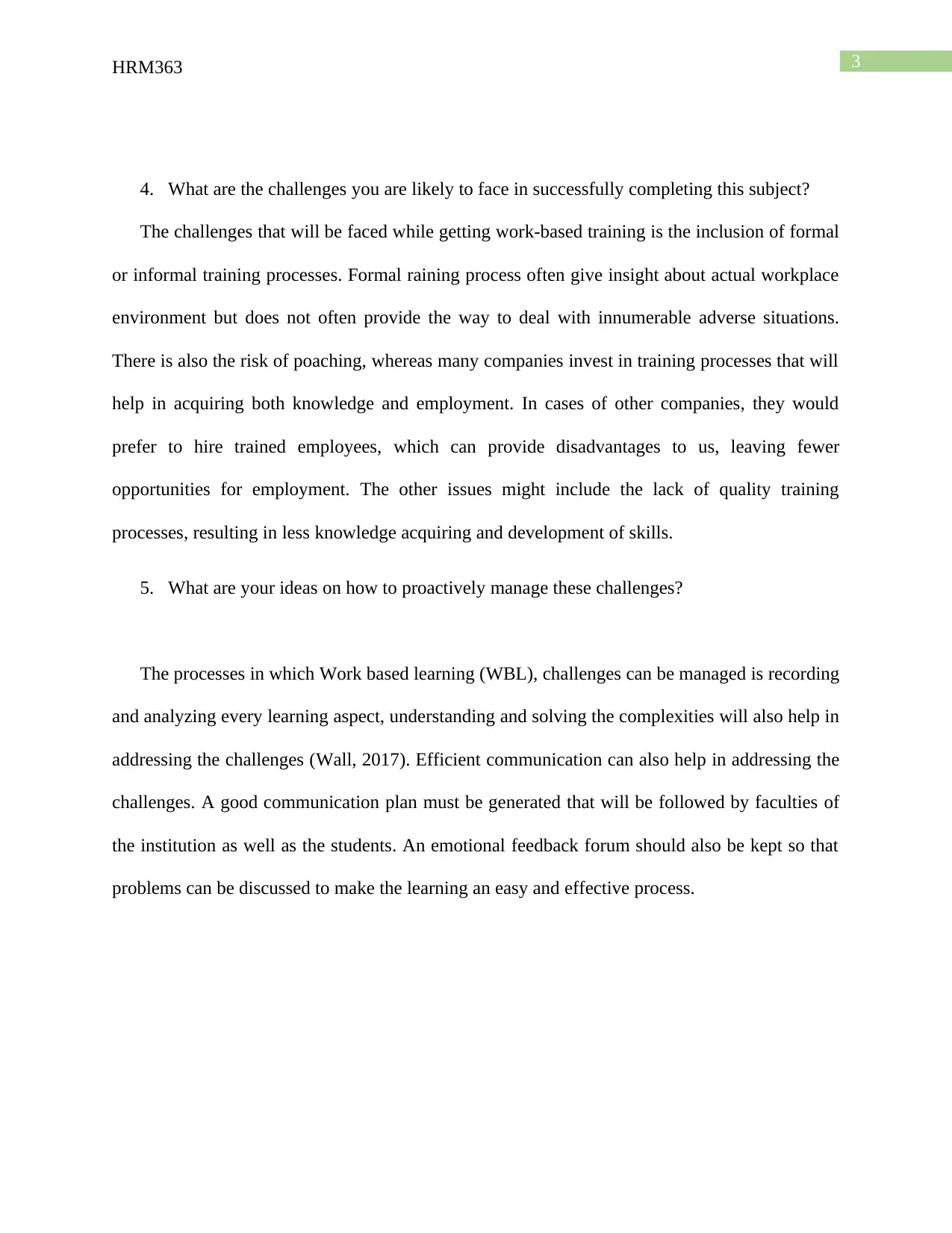
3HRM363
4. What are the challenges you are likely to face in successfully completing this subject?
The challenges that will be faced while getting work-based training is the inclusion of formal
or informal training processes. Formal raining process often give insight about actual workplace
environment but does not often provide the way to deal with innumerable adverse situations.
There is also the risk of poaching, whereas many companies invest in training processes that will
help in acquiring both knowledge and employment. In cases of other companies, they would
prefer to hire trained employees, which can provide disadvantages to us, leaving fewer
opportunities for employment. The other issues might include the lack of quality training
processes, resulting in less knowledge acquiring and development of skills.
5. What are your ideas on how to proactively manage these challenges?
The processes in which Work based learning (WBL), challenges can be managed is recording
and analyzing every learning aspect, understanding and solving the complexities will also help in
addressing the challenges (Wall, 2017). Efficient communication can also help in addressing the
challenges. A good communication plan must be generated that will be followed by faculties of
the institution as well as the students. An emotional feedback forum should also be kept so that
problems can be discussed to make the learning an easy and effective process.
4. What are the challenges you are likely to face in successfully completing this subject?
The challenges that will be faced while getting work-based training is the inclusion of formal
or informal training processes. Formal raining process often give insight about actual workplace
environment but does not often provide the way to deal with innumerable adverse situations.
There is also the risk of poaching, whereas many companies invest in training processes that will
help in acquiring both knowledge and employment. In cases of other companies, they would
prefer to hire trained employees, which can provide disadvantages to us, leaving fewer
opportunities for employment. The other issues might include the lack of quality training
processes, resulting in less knowledge acquiring and development of skills.
5. What are your ideas on how to proactively manage these challenges?
The processes in which Work based learning (WBL), challenges can be managed is recording
and analyzing every learning aspect, understanding and solving the complexities will also help in
addressing the challenges (Wall, 2017). Efficient communication can also help in addressing the
challenges. A good communication plan must be generated that will be followed by faculties of
the institution as well as the students. An emotional feedback forum should also be kept so that
problems can be discussed to make the learning an easy and effective process.
Paraphrase This Document
Need a fresh take? Get an instant paraphrase of this document with our AI Paraphraser
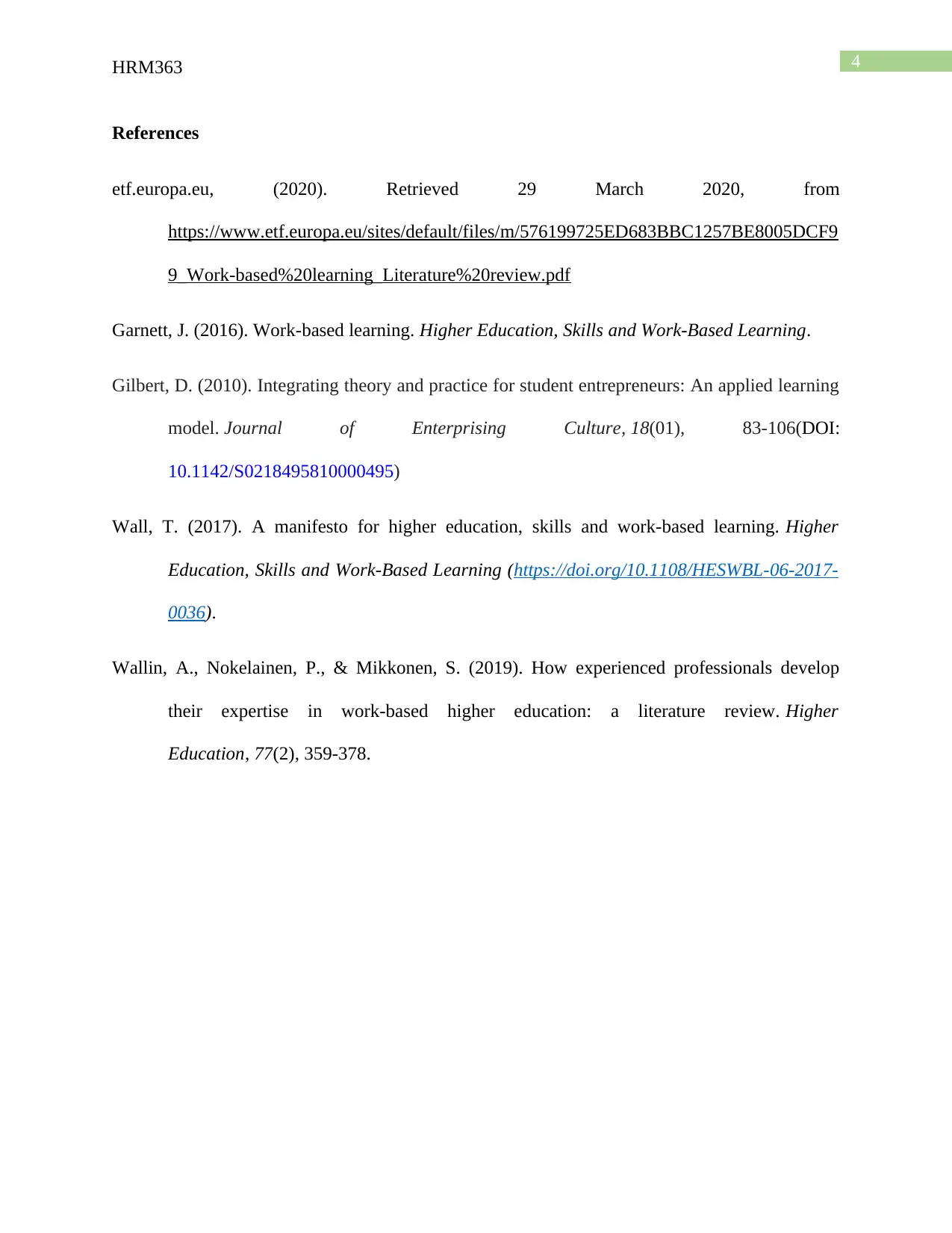
4HRM363
References
etf.europa.eu, (2020). Retrieved 29 March 2020, from
https://www.etf.europa.eu/sites/default/files/m/576199725ED683BBC1257BE8005DCF9
9_Work-based%20learning_Literature%20review.pdf
Garnett, J. (2016). Work-based learning. Higher Education, Skills and Work-Based Learning.
Gilbert, D. (2010). Integrating theory and practice for student entrepreneurs: An applied learning
model. Journal of Enterprising Culture, 18(01), 83-106(DOI:
10.1142/S0218495810000495)
Wall, T. (2017). A manifesto for higher education, skills and work-based learning. Higher
Education, Skills and Work-Based Learning (https://doi.org/10.1108/HESWBL-06-2017-
0036).
Wallin, A., Nokelainen, P., & Mikkonen, S. (2019). How experienced professionals develop
their expertise in work-based higher education: a literature review. Higher
Education, 77(2), 359-378.
References
etf.europa.eu, (2020). Retrieved 29 March 2020, from
https://www.etf.europa.eu/sites/default/files/m/576199725ED683BBC1257BE8005DCF9
9_Work-based%20learning_Literature%20review.pdf
Garnett, J. (2016). Work-based learning. Higher Education, Skills and Work-Based Learning.
Gilbert, D. (2010). Integrating theory and practice for student entrepreneurs: An applied learning
model. Journal of Enterprising Culture, 18(01), 83-106(DOI:
10.1142/S0218495810000495)
Wall, T. (2017). A manifesto for higher education, skills and work-based learning. Higher
Education, Skills and Work-Based Learning (https://doi.org/10.1108/HESWBL-06-2017-
0036).
Wallin, A., Nokelainen, P., & Mikkonen, S. (2019). How experienced professionals develop
their expertise in work-based higher education: a literature review. Higher
Education, 77(2), 359-378.
1 out of 5
Related Documents
Your All-in-One AI-Powered Toolkit for Academic Success.
+13062052269
info@desklib.com
Available 24*7 on WhatsApp / Email
![[object Object]](/_next/static/media/star-bottom.7253800d.svg)
Unlock your academic potential
Copyright © 2020–2026 A2Z Services. All Rights Reserved. Developed and managed by ZUCOL.



